Reformed robotics camp is underway

Arash Mashyari, a research scientist, right, talks about a robot with campers, Jett Green, 13, Jordan Schuster, 13, and Richard Barnes, 12, left to right, during the Summer 2020 Robotics Camp at the Florida Institute for Human & Machine Cognition (ihmc) in Ocala, Fla. on Tuesday, July 14, 2020. On Tuesday, campers were learning how to program their Lego robots to perform specific tasks. [Bruce Ackerman/Ocala Gazette] 2020.

Arash Mashyari, a research scientist, right, talks about a robot with campers, Jett Green, 13, Jordan Schuster, 13, and Richard Barnes, 12, left to right, during the Summer 2020 Robotics Camp at the Florida Institute for Human & Machine Cognition (ihmc) in Ocala, Fla. on Tuesday, July 14, 2020. On Tuesday, campers were learning how to program their Lego robots to perform specific tasks. [Bruce Ackerman/Ocala Gazette] 2020.
The football-size robot motored across the large square of carpet and nearly reached the edge before it abruptly turned and crashed into the straight line of obstacles in front of it.
No worries. The intrepid camper who was the brains behind the programming swiped up the robot and went off to tweak his calculations.
Welcome to the Institute for Human & Machine Cognition’s (IHMC) 2020 Robotics Summer Camp, where youthful inquisitiveness meets seasoned expertise.
IHMC, which is headquartered in Pensacola, has a campus in downtown Ocala. The organization pioneers technologies aimed at leveraging and extending human capabilities. Among the many topics of research is robotics.
The summer camp, offered in both locations, offers middle school students the opportunity to learn about computer programming and robots. Campers work to master Lego Mindstorms challenges as they develop teamwork skills, confidence in problem solving and creativity. In Ocala, the camps were scheduled July 13-16 for rising 7th and 8th graders and July 27-30 for rising 8th and 9th graders.
As one might imagine, the pandemic altered the scope and scale of this year’s endeavor.
“Well, it’s quite a bit different in the times of COVID-19 than it has been in the past,” said Ursula M. Schwuttke, Ph.D., IHMC’s director of educational outreach. “We have a reduced attendance of 15 campers instead of 20 to allow for greater physical distancing. Each camper has their own laptop, robot and charging station. In this past, those resources were shared.”
Schwuttke explained that, this year, there is a minimum of nine feet and, in some cases, as much as 11 feet, between camper work stations. The stations are color-coded so each group follows a different path through the building to get to their obstacle course to do their Ev3 robot challenges. The campers, teachers and volunteers all were wearing masks.
“In the past, there was one giant obstacle course that was shared,” she noted. “And there are color-coded arrows throughout the building so when going to lunch or snack or the restroom, not everybody is crowding down the same path.”

Dr. Gregory Cruz, the camp instructor, left, watches as camper David Kniedler, 12, operates his robot during the Summer 2020 Robotics Camp at the Florida Institute for Human & Machine Cognition (ihmc) in Ocala, Fla. on Tuesday, July 14, 2020. On Tuesday, campers were learning how to program their Lego robots to perform specific tasks. [Bruce Ackerman/Ocala Gazette] 2020.
She said the campers are all Marion County students.
“Their goal for the week is to become exposed to Lego Mindstorms robots and how to program those robots. And it’s different from other kinds of computer programming where you are just writing a program on a computer because the robots have sensors and can take information from the external environment to do things like navigate obstacle courses,” she said. “It’s a very interactive, fun, type of programming because instead of your program working or not working, your robot either successfully completes the obstacle course or crashes into some obstacle that results in, often, loud cheering or other enthusiasm, or disappointment, depending on the result.”
She said the Ocala camp has been led by Gregory Cruz, a physics teacher at Vanguard High School, for the last eight years and that many of the students may become scientists or engineers.
“But regardless of the outlook and academic preferences, learning how to program teaches everyone more about logical thinking and de-bugging programs teaches everyone about perseverance and believing in oneself and one’s ability to complete a task that seems difficult,” Schwuttke added. “We’ve also offered the same format to Marion County teachers so they can learn Lego Mindstorms curriculum and become familiar with the programming and offer it in their own classrooms. We’ve lent out robots to several schools for the school year. It’s paid for with the help of program sponsors.”
She said the sponsors include Lockheed Martin, Ocala Fiber Optic, CareerSource Citrus Levy Marion, Renasant Bank, Mid-FL Regional Manufacturers Association and Ocala Electric.
Development and Community Outreach Director Laurie Zink explained that an added bonus of the camp is that IHMC scientists, as well as other organizations, make guest appearances and interact with the students.
On Tuesday, IHMC researcher Arash Mahyari was there to be part of the program and have lunch with the campers.

A camper works on programing their robot during the Summer 2020 Robotics Camp at the Florida Institute for Human & Machine Cognition (ihmc) in Ocala, Fla. on Tuesday, July 14, 2020. On Tuesday, campers were learning how to program their Lego robots to perform specific tasks. [Bruce Ackerman/Ocala Gazette] 2020.
“We take small groups so they can have tons of interaction time,” Zink said. “They are able to ask questions about anything at all and it’s a great way for the kids to really relate and they can see that these scientists are real people and that they can be a scientist too.”
She said Ocala Fiber Network did a demonstration earlier in the week and that Lockheed Martin was slated for later in the session.
Sam Orr, a rising senior at Vanguard High School, attended camp in the past and this year served as a volunteer.
“We let them figure out the programming on their own but if they don’t understand it completely, we go in and help,” he offered.
Chloe Waldorf, a student at Howard Middle School, has a long-range goal of obtaining a degree in computer science or, perhaps, graphic design. She was a camper last summer.
“It’s fun and it teaches you how to use the program, how to build the robot,” she said. “If you came here and then went home, you could buy your own robot and do it yourself.”
And, in that regard, David Kniedler, also at Howard Middle, and a veteran of other camps, may have a leg up on his fellow campers.
“I wanted to learn more about the Ev3 robots since I’ve got one at home,” he said. “We can program it to do all sorts of stuff, like right now we’re trying to do a mission to push a bottle (plastic water bottle) and then return back to its place. My robot is working very well because I actually know what to do.”





